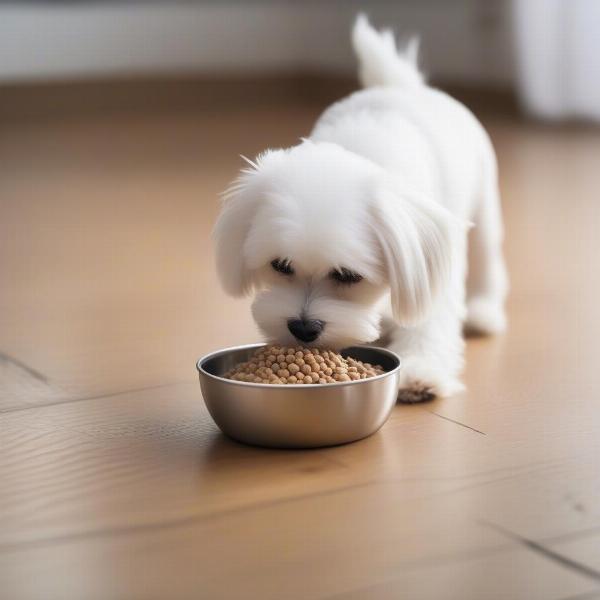Choosing the right dog food for your Maltese is crucial for their overall health and well-being. These small, elegant dogs have specific dietary needs, and finding good dog food for Maltese can be a daunting task with so many options available. This article will guide you through selecting the best nutrition for your Maltese, covering everything from understanding their unique requirements to choosing the perfect kibble or wet food.
Understanding Your Maltese’s Nutritional Needs
 Maltese dog enjoying a bowl of premium dog food
Maltese dog enjoying a bowl of premium dog food
Maltese dogs, with their luxurious white coats and playful personalities, require a diet tailored to their specific needs. Due to their small size, they have a higher metabolism and require more calories per pound of body weight than larger breeds. They also tend to be prone to dental issues, so choosing a kibble that helps maintain oral hygiene is beneficial. Finally, some Maltese are picky eaters, so finding a palatable food is essential.
Choosing the Right Type of Food: Kibble vs. Wet Food
What’s better, kibble or wet food? There’s no single right answer, as the best choice depends on your individual dog. Kibble is often more convenient and affordable, while wet food can be more appealing to picky eaters. Some owners opt for a combination of both. For Maltese, smaller kibble sizes are usually easier to chew.
Key Ingredients to Look For in Good Dog Food for Maltese
- High-quality protein: Look for real meat or poultry as the first ingredient. Chicken, turkey, lamb, and fish are excellent sources of protein for Maltese.
- Healthy fats: Essential fatty acids like omega-3 and omega-6 contribute to healthy skin and a shiny coat.
- Digestible carbohydrates: Sources like brown rice, sweet potatoes, and oatmeal provide energy and are easier on the digestive system.
- Vitamins and minerals: Ensure the food is fortified with essential vitamins and minerals for optimal health.
- Avoid fillers and artificial ingredients: These offer little nutritional value and can sometimes cause digestive upset.
Addressing Common Maltese Health Concerns Through Diet
Some Maltese are predisposed to certain health issues, such as tear staining, allergies, and dental problems. Choosing a food formulated to address these concerns can be beneficial. For example, some foods contain ingredients that help reduce tear staining, while others are designed for sensitive stomachs.
Recommended Dog Foods for Maltese
While individual needs may vary, here are some examples of generally well-regarded dog food brands that offer formulas suitable for Maltese:
- Royal Canin Maltese Adult Dry Dog Food
- Hill’s Science Diet Adult Small & Toy Breed Dry Dog Food
- Purina Pro Plan Adult Small Breed Formula
How Much Should You Feed Your Maltese?
The amount of food your Maltese needs will depend on their age, activity level, and metabolism. Follow the feeding guidelines on the dog food packaging as a starting point and adjust as needed. It’s important to monitor your dog’s weight and body condition to ensure they are maintaining a healthy weight.
What to Avoid in Maltese Dog Food
- Artificial colors, flavors, and preservatives
- Fillers like corn, wheat, and soy
- By-products
- Excessive amounts of sugar and salt
Conclusion
Finding good dog food for Maltese requires careful consideration of their unique needs. By focusing on high-quality ingredients, avoiding fillers and artificial additives, and considering any specific health concerns, you can help your Maltese thrive and live a long, healthy life. Remember to consult your veterinarian for personalized dietary recommendations.
FAQ
- What is the best type of dog food for a Maltese puppy? Puppy formulas are specifically designed to meet the nutritional needs of growing dogs. Look for a small breed puppy food.
- My Maltese is a picky eater, what can I do? Try adding warm water or a small amount of wet food to their kibble to make it more appealing.
- How often should I feed my Maltese? Most adult Maltese do well with two meals per day.
- Can I give my Maltese human food? Some human foods are safe for dogs in moderation, but many are toxic. Consult with your veterinarian before giving your Maltese any human food.
- What are the signs of food allergies in Maltese? Itching, skin irritation, gastrointestinal upset, and ear infections can be signs of food allergies.
- Is grain-free dog food good for Maltese? While some dogs benefit from grain-free diets, it’s not necessarily better for all dogs, including Maltese. Discuss this with your vet.
- How can I help my Maltese maintain healthy teeth? Regular brushing, dental chews, and a diet designed for dental health can help.
Related Articles:
- lap dog rescue albuquerque new mexico
- maltipoo rescue dogs
- hypoallergenic dogs for sale under 0
- teddy dog
About ILM Dog:
ILM Dog is your trusted international resource for expert advice on dog breeds, health, training, nutrition, and more. We provide practical and reliable information to help dog owners worldwide provide the best possible care for their furry companions. Whether you are considering adopting a lap dog, dealing with allergies in your Maltipoo, or simply looking for cute teddy bear dog price, our expert articles offer valuable insights and guidance. Contact us at [email protected] or +44 20-3965-8624 for more information.